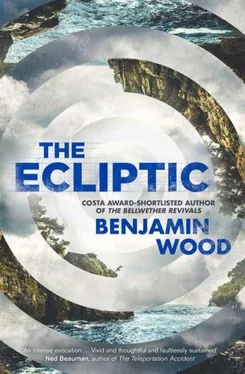MacKinney leaned closer to the pane. ‘A bit of snow shouldn’t stop anyone who needs this place enough. Man or woman. And, anyway — he seems fine now, look. He’s not complaining.’
‘Can’t be anything left to spit up,’ Pettifer said. ‘Half his guts are on the ground.’
He took my boot tip in the shin for this. ‘I wish you wouldn’t revel in it quite so much. When was the last time you hiked anywhere?’
‘I ran cross-country when I was his age.’ He patted his paunch. ‘Now I can’t get off the toilet in the morning.’
‘Jesus,’ Quickman said. ‘What an image.’
‘You’re welcome.’
It was difficult now to recall the days when Pettifer and Quickman were strangers to me. They had landed at the refuge a season apart, but they had bonded almost immediately, over a dinnertime discussion of the weather (what better topic was there for two Englishmen to deliberate upon?). Later, when MacKinney and I had been playing backgammon at the shady end of the portico, they had both lurked some distance from our board with glasses of çay , making disparaging remarks about our game in whispered voices. ‘If you’re going to sit there tittering all day,’ MacKinney had called to them, ‘why don’t you come and show us how it’s done? We’re not exactly playing to the death.’ They had apologised for their rudeness and sat down with us. ‘Didn’t anyone ever tell you,’ Quickman had said, ‘that all games should be taken seriously? My father used to drill that into me.’ I had scowled at him then, uncertain of his meaning. ‘Still, once you’ve seen a grown man break his ankle playing musical chairs, you start to question his advice a bit.’ Mac had laughed her big, ingenuous laugh, and that was it — the beginning of our attachment. It did not seem to matter that we had travelled thousands of miles to remove ourselves from the hindrances of life in Britain only to hitch ourselves to each other.
‘Has anybody seen Ender? Someone’s got to let the boy inside.’ I looked back into the emptying mess hall, where the old caretaker had last been spotted at the back of the line for bluefish stew. A few of the other guests were still finishing their lunches, alone together on the same long table. We had hardly taken the time to learn their names, but we had heard about their projects in various ways and dismissed them as short-termers already—‘transients’, Pettifer called them, which was his way of saying ‘lesser talents’.
It was our judgement that the duration of a stay at Portmantle was equivalent to the value of the work being done: if you were gone after one season, it was likely because your project could not sustain a greater period of gestation. For example, there was the Spanish poet we had spoken to at lunch, who had proudly announced that he was working on a sequence of minimalist poems that were disdainful of linearity, narrative, and meaning. ‘Sounds like an important collection,’ Quickman had responded, and turned his head to roll his eyes at us. ‘If anything needs to be eradicated from poetry, it’s meaning.’ The Spaniard had nodded at this, deaf to the sarcasm, and proceeded to discuss the remarkable complexity of his work with Quickman, whose feigned interest was admirably upheld throughout.
We gave this poet two seasons, maximum. Any guest who could not wait to talk about the project he was working on was usually a short-termer — that was our evaluation. Anyone who proclaimed his own genius was a fraud, because, as Quickman himself once put it, genius does not have time to stand admiring its reflection; it has too much work to get finished. We never sought out the company of short-termers. We left them to work and find their clarity alone, while we got on with jabbing at our own unwieldy projects. None of us seemed to recognise the fact that our separation from the others was, in fact, a tacit declaration of our own genius — and, thus, it surely followed that we were the biggest frauds of all. We did not even consider that the purest talent at Portmantle was standing at the front gate in a pool of his own vomit.
‘No point calling the old man,’ said Quickman, eyes on the window. ‘Our boy’s about to hit the buzzer.’ And right on cue, the hallway below us echoed with the sound of it: three long, grating blasts. Quickman set the pipe back in the crease of his mouth. ‘Places, everyone,’ he said, his voice betraying a little excitement.
The buzzer sounded again.
Ender, the old caretaker, emerged from the mess hall with a napkin stuffed inside his shirt collar. It was streaked with pale stew-stains. He was still holding his spoon. ‘It is him?’ he said. ‘The ringing?’
‘Yup,’ said Pettifer. ‘He’s probably got hypothermia by now. Better hop to it.’
‘OK. I go. You stay.’ Ender tore the napkin from his collar, dabbed his moustache clean, and tucked the spoon into his breast pocket. He went scuttling down the stairs. ‘You can wait inside the library, yes?’ he called back to us from the bottom step, putting on his coat. ‘I bring him.’
From the window, we watched the old man tread across the thick white lawns, making holes in the snowpack. He carried the provost’s shotgun with him, as was the customary practice, hinged over his left forearm, unloaded. The fur trim of his parka matched the two-tone grey of his hair. When he got to the gate, he spoke to the boy through the ironwork.
There was a passphrase incoming guests were told to use, which the provost changed every season, though it was usually a line from a poem or some favourite literary reference. MacKinney and I had both been given the same quote to recite: Eastward we turn and homeward, alone, remembering. Pettifer had: To turn, as swimmers into cleanness leaping, glad from a world grown old . Quickman’s had been a translation of a Turkish author, Hüseyin Rahmi Gürpinar, whose work was the provost’s academic fetish, though Quickman claimed he could not remember the line in detail. Poor old Ender had to memorise all of these passphrases every season, his spoken English being the most reliable. His mind must have been loaded with enough disordered verse to rival our resident Spaniard. But, in all his time as caretaker, there had been no cause for him to fire a single shot. The system worked too well. Anyone who deigned to buzz the gate at Portmantle had to know the procedure for entry. You would be turned away at gunpoint if you did not.
After Fullerton had spoken his noiseless passphrase, the old man let him in. The boy stepped through, peering up at the window where we stood above the portico. If he saw us staring back at him, he did not let on. He waited patiently for Ender to lock up, and then the two of them slogged across the grounds in single file.
At the front steps, Fullerton stopped to kick the powder off his heels and switched his bag to the other shoulder. He gazed back in the direction he had travelled, pausing there awhile, as though the gate signified a line between the present and the past and he was taking a moment to acknowledge the gravity of his circumstance. We had seen this quirk of behaviour in others. Some time ago, too far back to recall how it felt, we had made the same gesture ourselves.
‘We ought to get a move on,’ MacKinney said.
We went along the corridor, into the dark library with its classroom smell and its awkward collection of furniture. I opened the curtains and switched on the lamps. Pettifer and Quickman crouched at the hearth, debating the merits of lighting a fire. ‘How long are we expected to entertain this lad?’ Pettifer asked of nobody in particular. ‘I mean, there’s only so long I can sustain these airs and graces.’
‘Just hurry up and light the thing. He’ll be in need of it,’ MacKinney told him.
Читать дальше












